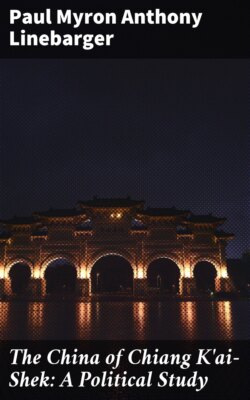Читать книгу The China of Chiang K'ai-Shek: A Political Study - Paul Myron Anthony Linebarger - Страница 24
На сайте Литреса книга снята с продажи.
Chapter III
CONSULTATIVE AND ADMINISTRATIVE ORGANS
ОглавлениеTable of Contents
The outbreak and continuance of war has left the fulcrum of power relatively untouched. The highest organs of state are primarily in Kuomintang hands; the Party Chief of the Kuomintang is, even at law, governmentally more important today than in 1937; and the constitutional monopoly of power remains under the Kuomintang. Even changes in the highest organs—such as establishment of the Supreme National Defense Council and the Military Affairs Commission—have left very little impress on the sources of power. Reforms have altered only the mode of power, not its tenure.
Modifications have, however, been introduced at the level of government just below the apex. These are important in two remarkable ways. The People's Political Council (Kuo-min Ts'an-chêng Hui) admixed an ingredient of representation which (save for the Party) had been lacking since the dubious, betrayed, inaugural years of the Republic. Furthermore, sweeping administrative reorganization and reinvigoration made possible the vitalization of the central government in the course of the war, so that despite Japanese pressure and rising Leftist rivalry, the National Government is, on any absolute scale, becoming more powerful year by year.
